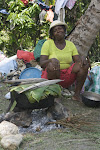We left Port-au-Prince to visit the countryside, more precisely the Plateau-Central, the poorest region of Haiti. The road that led us there was indicative of the state of the country, as it resembled a mountain riverbed as opposed to a smooth paved highway, much like the life of your average Hatian. En route we passed Peligre Dam designed and built in 1950 to provide electricity to factories in Port-au-Prince, but not for the people of the region. Currently it only provides on average 3 hours of electricity per day, and only to those who can afford it.
As we progressed along the so-called road, we witnessed acute poverty in the form of shanty homes built of scrap wood/metal, roaming goats and chickens, sparse vehicles loaded with mangoes, bananas, and people in the room that was left, many of whom were scantily dressed. Most of the people we witnessed along the road were simply waiting in front of their homes. Others were involved in the mango harvest using boney horses and donkeys to transport the produce.
We arrived in Hinche, the capital of the Plateau-Central, where we met with regional coordinators of the CTH, none of whom are paid for their union work. They explained the conditions within each sector they represented: Commerce, cooperatives, journalism, construction, youth work, transportation, women's issues, agricultural workers, professional artisans etc. And then each sector went into great detail as to what their problems were. The overwhleming obstacle was a complete and utter lack of infrastructure, such as means of transportation for their products, financial assistance to propel growth, irrigation, modern tools, local places to meet, schools, drinkable water, electricity, hospitals, social security or services, job training, child care, etc..
For the 55,000 people on the plateau, one of the only recourses is to work in the sugar can fields of the Dominican Republic for starvation wages, under conditions of extreme discrimination. The only other recourse is to go to Port-au-Prince and attempt to join the informal economy. For many women this means prostitution, and for many men this means unemployment, begging or petty crime.
Sunday, April 27, 2008
April 25, 2008 (Second Day)
Subscribe to:
Post Comments (Atom)























No comments:
Post a Comment